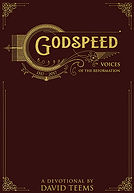


Mother love is stronger than the filth and scabbiness on a child, and so the love of God toward us is stronger than the dirt that clings to us.
—Martin Luther

IT STARTED WITH A BOLT OF LIGHTNING. Literally. The loud crack unnerved the young student with such authority, he cried out, "St. Anne, St. Anne. I will become a monk." Both literal and figurative, the lightning did the world a favor. It was the rod that shepherded the young student toward his destiny.
Since it was John Wycliffe who first wrote of the abuses of the Roman Catholic Church in the mid 1300s, paternity for the Reformation rightly goes to Wycliffe, or at least a shared paternity with Luther. Metaphorically we can say with some authority that Wycliffe was the lightning to Luther's thunder. Luther and his followers thought of themselves as "Hussites" after the teaching of Jan Hus (1369-1415), the Bohemian reformer. Hus considered himself and his followers "Wycliffites" after the teaching of John Wycliffe (1320s-1384). Either way, reform, it seems, migrated from Wycliffe to Hus to Luther, having its ignition, its "Big Bang" in Luther. It was a timing thing. There was a lot of Big Bang in Luther.
Luther fascinates at many levels, but most particularly at a human level. For all his theological brawn, he is magnificently human. Possessing a prodigious and tampering wit, later in life, when a young monk was nearby writing everything the celebrated Luther was saying, Luther took up a spoonful of porridge, hurled some at the unsuspecting youth, and said, "Put that in your book." He had major revelations while sitting on the toilet (cloaca). He drank quantities of Wittenberg beer, particularly for his chronic melancholia, and used flatulence to chase away the devil (or throwing a bottle of ink). This is Luther not afraid to be Luther, the great man showing the true range of his greatness. The following is another Luther entry from GODSPEED.



Luther, like many of us, had a dark side as well. He wrote a tract called THE JEWS AND THEIR LIES. I suspect by the title, I don't have to elaborate on its content. Luther had a beef with the Jews because they rejected Christ. Though he never suggested genocide, when the Nazis came along centuries later, Goebbels used Luther's own words to promote and cultivate Nazi agenda. It is not the proudest spot in the Luther imaginary.
But more than any other thing you might say about the Saxon, Dr. Luther, he loved God. And he was terrified of God. He called the condition anfechtungen. It means assault or something like it, something close to a terrified conscience. It has no specific English equivalent. Temptations is close but lacks the intensity or bite that the German word has. But however cruel or ill-informed his inner monologue, bully that it is, Luther came to an impasse at Romans 1:17. He was still a victim of his anfechtungen, his “thorn in the flesh,” but illuminating this passage illuminated him, and provided powerful medication against his torment.
Sintemal darin offenbart wird die Gerechtigkeit, die vor Gott gilt, welche kommt aus Glauben in Glauben; wie denn geschrieben steht: "Der Gerechte wird seines Glaubens leben.
ROMANS 1:17 LUTHERBIBEL
For in the gospel the righteousness of God is revealed—a righteousness that is by faith from first to last, just as it is written: “The righteous will live by faith.”
ROMANS 1:17 NEW INTERNATIONAL VERSION
You owe it to yourself to discover Martin Luther. He was, like Leonardo, somewhat of a polymath, that is, he could do many things well, and exercise his genius with the same intensity with each. He never fails to fascinate. Even his dark side is delicious in a curious way. He was never afraid to be himself.
IF YOU ARE INTERESTED IN READING MORE ON THE LIFE OF MARTIN LUTHER:
Martin Luther: The Man Who Rediscovered God and Changed the World BY ERIK METAXAS
Martin Luther: The Christian Between God and Death BY RICHARD MARIUS
Here I Stand: A Life of Martin Luther BY ROLAND BAINTON
October 31, 1517: Martin Luther and the Day that Changed the World MARTIN MARTY
Table Talk By MARTIN LUTHER
These selections are just a start, but a really good start, enough to arouse appetite, and with Luther, appetite is half the understanding.





